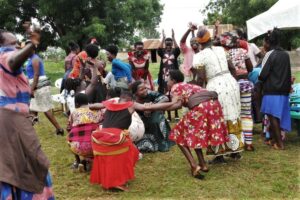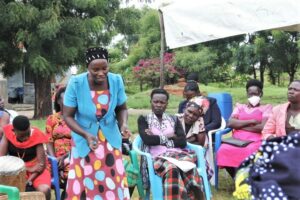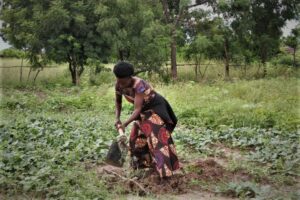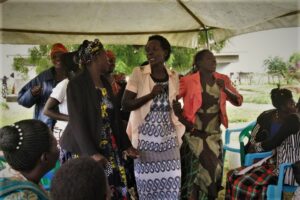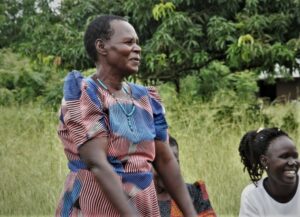EXCHANGE VISITS FOSTER LEARNING AND SOLIDARITY AMONG WOMEN FIGHTING AGAINST LAND GRABBING
Last month, we supported an exchange visit in Buliisa which brought together five women grassroots groups, who have been at the forefront of the struggles against land injustices within their communities. The communities are Alebtong, Kween, Omoro, Logiri, and Buliisa. Exchange visits bring women from different regions together to gain insight into the struggles of other communities dealing with similar problems. The visits provide a platform for women to share experiences and lessons, which has inspired them to try new nonviolent strategies and broaden their knowledge of social change initiatives. Women have been empowered to overcome the patriarchal norms that view them as inferior and the intimidation from perpetrators, especially when they hear from those that have succeeded in the past.
Kiiza Goretti shared about the land struggles in Buliisa and the women’s nonviolent efforts to end them. Buliisa is a highly patriarchal society and women barely have any rights to own land. Since the discovery of oil in the region in 2008, the situation has worsened aggravating land grabbing and the associated injustices. Goretti commended the women for uniting and using defiant tactics like the bicycle riding caravan to protest the exclusion of women in decision-making processes on land use and management, a tactic they also used to push for better service delivery within the community.
Riding bicycles by women is considered taboo in many communities in Western Uganda, Buliisa inclusive. Not only did these women use this action to challenge patriarchy, but they also used it as a means of demanding better social services and inclusion in decision-making concerning land ownership and compensation. Through this action, attention was also drawn to the poor health conditions in the maternity ward at Buliisa health center IV. The maternity ward was crowded, and mothers had no space to sleep whenever they went to the hospital for delivery. As a result of the actions conducted by the women, two ambulances were given to the district and a tent was secured to help curb the congestion. Even though the tent is not ideal, the women are happy that they at least have additional space to deal with the overcrowding. They hope that a bigger and more functional maternal ward is set up by the government very soon.
“I bought land, registered it in my names, and have uncontested complete rights to it. Judith Berurwoth from Buliisa says, “I am grateful for the training on women’s rights to own land because it motivated me to buy my land, which I now cultivate freely and use the income I earn to feed my family. She continues by saying that Buliisa’s land issues still exist in other areas but the women will not stop spreading their impact.
The women from Alebtong say that they suffer a similar problem with patriarchal cultural norms in their community which deter women from owning land. However, the women have united to fight against land injustices as a community. Professor Boto and his family were grabbing community land in her village, Awei in Alebtong to construct a university, a facility that was not needed given that the community even has no functional primary and secondary schools. The level of illiteracy is alarming. Over 50 households rely on farming on this community land, which is owned by the clan. It was inevitable for them to defend their source of livelihood. As family caregivers, women suffer the brutal effects of evictions and land grabbing. This is why they have committed to defending their land at all costs. They were successful in preventing the construction of the university amidst threats and intimidation from Professor Boto and security operatives. The Awei women have also employed music as a tool in their fight against land grabbing and other injustices. The community believes that the solution to their problems is not a greedy land grabber constructing a university that they can barely afford but the protection of their land to support their livelihoods.
“As a result of empowering us regarding our rights to land as women, I was able to buy my own land and I registered the land title in my names, “Akite from Alebtong remarked.
Lalam Lucy from Opit in Omoro described the land conflict in their community, where a wealthy man named Fred Kajula employed three policemen to frighten farmers out of using the communal farmland and claimed ownership of more than 60 acres of property. The women staged a peaceful sit-down protest in the garden and told the policemen that the same man had lost a court case over the same community land which he was trying to encroach on illegally. The women also deployed other community members to deliver documents from the court ruling to the Local Chairperson 5 and Resident District Commissioner of Omoro, who subsequently granted the community’s demands to freely cultivate their land.
“I am grateful for this engagement because it has shown me that women in other regions are facing a similar problem like us. I have also learned that even after we recovered our community land, it is important for us to continue working together as women to address other problems affecting women beyond land. We need to use the same platform to demand better service delivery because we are lacking in many areas,” Adong Milly from Omoro said.
The people of Logiri were able to retrieve their land from the National Forestry Authority (NFA) after they conducted several protest actions and are now farming it. Mildred Gasi, one of the women from Logiri emphasized the significance of defending cultural land from perpetrators because it is the community’s heritage and identity. She shared how they have employed music and poetry in their campaigns to expose how NFA has perpetrated land grabbing and several associated injustices like burning homes. To prove the legality of their ownership, the women also sent a representative to Uganda Land Council to recover the documents that show the borderline between the Okavurera forest reserve and settlement land, which revealed that the reserve had extended the borders into the residents’ land by miles. The community now successfully cultivates their land, which has greatly improved their livelihoods.
“I have been inspired by the women’s testimony, and we are going back to expand nonviolent efforts to our surrounding villages who are suffering from the same crisis so that they can enjoy their land like we do.” – Gloria from Logiri community
Monica Chebet shared the experience of the indigenous people of Benet, who have been suffering a land conflict for the longest time in Uganda owing to the greed of the state which has driven the people out of their ancestral land. She explained that the Benet are indigenous peoples of Uganda but the Uganda Wildlife Authority (UWA) rangers have tortured their people and also defiled their women and girls, as well as confiscated their animals. The women have united and have been at the forefront of the struggle in Kween, organizing nonviolent actions such as occupations, protests, and the replanting of indigenous trees that were cut by UWA rangers.
“We will not stop the fight to recover our land because now we have seen that there are other facing the same problem and they have persisted and have succeeded” – Monica.
Shared learning during exchange visits has a direct impact on the communities’ readiness to engage in nonviolent actions and stand in solidarity with each other. Women have been inspired by others’ experiences who have succeeded before them. The stories have triggered creativity in the efforts of the women fighting to recover their land and put an end to systematic and systemic injustices against women.


